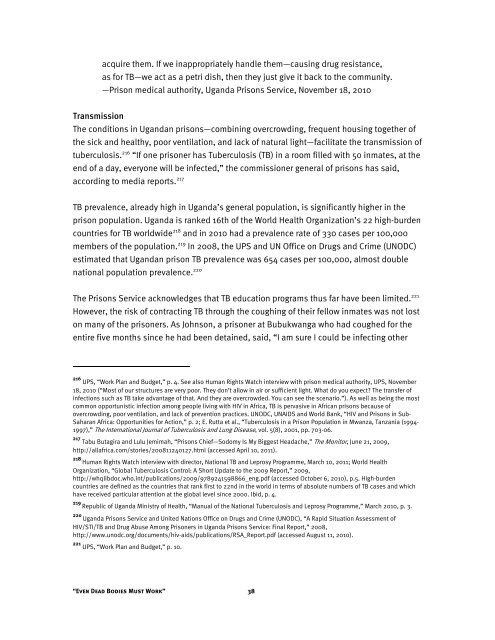Even Dead Bodies Must Work - Office of the High Commissioner for ...
Even Dead Bodies Must Work - Office of the High Commissioner for ...
Even Dead Bodies Must Work - Office of the High Commissioner for ...
Create successful ePaper yourself
Turn your PDF publications into a flip-book with our unique Google optimized e-Paper software.
acquire <strong>the</strong>m. If we inappropriately handle <strong>the</strong>m—causing drug resistance,<br />
as <strong>for</strong> TB—we act as a petri dish, <strong>the</strong>n <strong>the</strong>y just give it back to <strong>the</strong> community.<br />
—Prison medical authority, Uganda Prisons Service, November 18, 2010<br />
Transmission<br />
The conditions in Ugandan prisons—combining overcrowding, frequent housing toge<strong>the</strong>r <strong>of</strong><br />
<strong>the</strong> sick and healthy, poor ventilation, and lack <strong>of</strong> natural light—facilitate <strong>the</strong> transmission <strong>of</strong><br />
tuberculosis. 216 “If one prisoner has Tuberculosis (TB) in a room filled with 50 inmates, at <strong>the</strong><br />
end <strong>of</strong> a day, everyone will be infected,” <strong>the</strong> commissioner general <strong>of</strong> prisons has said,<br />
according to media reports. 217<br />
TB prevalence, already high in Uganda’s general population, is significantly higher in <strong>the</strong><br />
prison population. Uganda is ranked 16th <strong>of</strong> <strong>the</strong> World Health Organization’s 22 high-burden<br />
countries <strong>for</strong> TB worldwide 218 and in 2010 had a prevalence rate <strong>of</strong> 330 cases per 100,000<br />
members <strong>of</strong> <strong>the</strong> population. 219 In 2008, <strong>the</strong> UPS and UN <strong>Office</strong> on Drugs and Crime (UNODC)<br />
estimated that Ugandan prison TB prevalence was 654 cases per 100,000, almost double<br />
national population prevalence. 220<br />
The Prisons Service acknowledges that TB education programs thus far have been limited. 221<br />
However, <strong>the</strong> risk <strong>of</strong> contracting TB through <strong>the</strong> coughing <strong>of</strong> <strong>the</strong>ir fellow inmates was not lost<br />
on many <strong>of</strong> <strong>the</strong> prisoners. As Johnson, a prisoner at Bubukwanga who had coughed <strong>for</strong> <strong>the</strong><br />
entire five months since he had been detained, said, “I am sure I could be infecting o<strong>the</strong>r<br />
216 UPS, “<strong>Work</strong> Plan and Budget,” p. 4. See also Human Rights Watch interview with prison medical authority, UPS, November<br />
18, 2010 (“Most <strong>of</strong> our structures are very poor. They don’t allow in air or sufficient light. What do you expect? The transfer <strong>of</strong><br />
infections such as TB take advantage <strong>of</strong> that. And <strong>the</strong>y are overcrowded. You can see <strong>the</strong> scenario.”). As well as being <strong>the</strong> most<br />
common opportunistic infection among people living with HIV in Africa, TB is pervasive in African prisons because <strong>of</strong><br />
overcrowding, poor ventilation, and lack <strong>of</strong> prevention practices. UNODC, UNAIDS and World Bank, “HIV and Prisons in Sub-<br />
Saharan Africa: Opportunities <strong>for</strong> Action,” p. 2; E. Rutta et al., “Tuberculosis in a Prison Population in Mwanza, Tanzania (1994-<br />
1997),” The International Journal <strong>of</strong> Tuberculosis and Lung Disease, vol. 5(8), 2001, pp. 703-06.<br />
217 Tabu Butagira and Lulu Jemimah, “Prisons Chief—Sodomy Is My Biggest Headache,” The Monitor, June 21, 2009,<br />
http://allafrica.com/stories/200811240127.html (accessed April 10, 2011).<br />
218 Human Rights Watch interview with director, National TB and Leprosy Programme, March 10, 2011; World Health<br />
Organization, “Global Tuberculosis Control: A Short Update to <strong>the</strong> 2009 Report,” 2009,<br />
http://whqlibdoc.who.int/publications/2009/9789241598866_eng.pdf (accessed October 6, 2010), p.5. <strong>High</strong>-burden<br />
countries are defined as <strong>the</strong> countries that rank first to 22nd in <strong>the</strong> world in terms <strong>of</strong> absolute numbers <strong>of</strong> TB cases and which<br />
have received particular attention at <strong>the</strong> global level since 2000. Ibid, p. 4.<br />
219 Republic <strong>of</strong> Uganda Ministry <strong>of</strong> Health, “Manual <strong>of</strong> <strong>the</strong> National Tuberculosis and Leprosy Programme,” March 2010, p. 3.<br />
220 Uganda Prisons Service and United Nations <strong>Office</strong> on Drugs and Crime (UNODC), “A Rapid Situation Assessment <strong>of</strong><br />
HIV/STI/TB and Drug Abuse Among Prisoners in Uganda Prisons Service: Final Report,” 2008,<br />
http://www.unodc.org/documents/hiv-aids/publications/RSA_Report.pdf (accessed August 11, 2010).<br />
221 UPS, “<strong>Work</strong> Plan and Budget,” p. 10.<br />
“<strong>Even</strong> <strong>Dead</strong> <strong>Bodies</strong> <strong>Must</strong> <strong>Work</strong>” 38

















